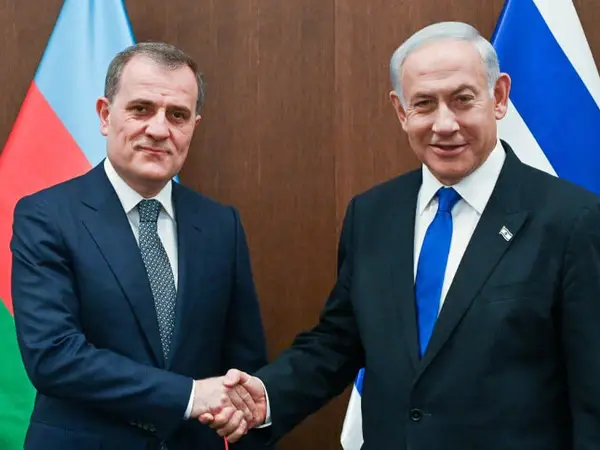Prince Reza Pahlavi and Solidarity for a Free Iran have slammed a letter by 33 Knesset members to Israeli foreign minister Eli Cohen, threatening Iran's territorial integrity.
Following Cohen's recent state visit to Azerbaijan, the Knesset members in a letter delivered to Cohen’s office asked the Israeli government to “pressure Iran to stop oppressing the Azeri minority in northwest Iran” based on a request by the Jewish community in Azerbaijan.
Before a scheduled speech at the Anti-Defamation League, Pahlavi strongly condemnedthe action of the Israeli lawmakers.
“The verbal assault on Iran’s territorial integrity by 32 members of the Israeli parliament is completely unacceptable and a service to the interests of the anti-Iranian Islamic Republic regime.”
Also, in a statement published on Twitter Sunday, the diaspora political group (7th Aban Front in Persian) said the Knesset members’ letter regarding “the Azeri minority” in Iran is “a clear case of action against Iran's existence”.
“Solidarity for a Free Iran considers this letter a hostile act against the Iranian nation and strongly condemns it,” the statement said.
“It is noteworthy that the letter of these Knesset members is in sheer contradiction with the statements made by Israeli government officials regarding friendship between the two nations of Iran and Israel during the recent visit of Prince Reza Pahlavi,” Solidarity for Free Iran said.
Prince Reza Pahlavi, a leading opposition figure, had visited Israel earlier this month and met with Israeli officials including Prime Minister Benjamin Netanyahu. This was the first time a prominent Iranian political figure had paid a public visit to Israel.
The group also stressed its belief in friendly relations with all countries and fighting against “reactionary discourses such as antisemitism” in the post-Islamic Republic Iran and condemned the Iranian regime’s animosity toward Israel but added that they would not allow “any country or political group to take advantage of such principles to spread hate and contentiousness against the Iranian nation.
The Knesset members accused the Iranian regime of “carrying out a policy of cultural genocide by restricting the right of members of the Azeri minority to study and spread its heritage, to teach its language and even to register children with Azeri national names.”
Around a quarter of Iran’s population is Turki-speaking Azari (in Iran the word is Azari – not Azeri), with analysts and activists disagreeing over the closeness of their cultural-linguistic links to their neighbors to the north.
It should be noted that Supreme Leaser Ali Khamenei and many past and current high-ranking Iranian officials come from the Azari community.
The letter said the Jewish community of Azerbaijan is “very concerned” about the persecution of the said ethnic minority in Iran and stressed that the country of Azerbaijan is one of the most important strategic allies of Israel in the region.
“Obtaining international support as broad as possible for the national aspirations of the people of South Azerbaijan (term used by Baku for Iran’s Azarbaijan) will be a fatal blow to the Ayatollah regime, and establishment of the sovereign state of South Azerbaijan,” they wrote.
Supporting the separation of what they called South Azerbaijan from Iran would also be “an appropriate response on the level of political activism to the subversion of the Ayatollah regime” against Israel.
Tensions have been high between Tehran and Baku, an Israeli ally since November 2022 when both sides accused each other of engaging in terrorism and espionage. Tehran has also accused Baku of harboring Israeli intelligence and military elements that plan to use its territory in a possible attack against Iran’s nuclear facilities.
Solidarity for a Free Iran was founded by prominent political activists after a gathering of political and civil activists from the Iranian diaspora in Brussels in late October, less than three months after Mahsa Protests began and spread across the country.
